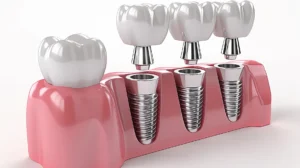Table of Contents
At Lockwood Family Dental, we understand how important it is to replace missing teeth for both your oral health and your confidence. Whether you need full or partial dentures, our team is here to guide you through the process and help you make an informed decision. Full and partial dentures not only restore your smile but also prevent remaining teeth from shifting out of place, helping you maintain proper function and appearance. Below, we explain the differences between full and partial dentures, and the benefits each option provides.
Full Dentures
Full dentures are designed to replace an entire arch of missing teeth. These natural-looking appliances are custom-made to fit comfortably over your gums, restoring your smile and facial structure. Without full dentures, missing teeth can lead to sagging facial muscles, which can cause a prematurely aged appearance. Additionally, full dentures help you chew comfortably and speak clearly, improving both function and aesthetics.
To prepare for full dentures, any remaining teeth in the arch may need to be extracted. After your teeth are removed, your gums will require some healing time—typically around 8 to 12 weeks—before the conventional dentures are placed. These dentures are secured in place by suction, attaching to the roof of your mouth, and can be removed for cleaning or while you sleep.
Partial Dentures
If you are missing only a few teeth, partial dentures may be the ideal solution. These removable appliances are used to fill gaps between your natural teeth, helping to restore both the look and function of your smile. Partial dentures clasp onto neighboring teeth and are custom-made to blend seamlessly with your gums and surrounding teeth, allowing you to chew, speak, and smile with ease.
Partial dentures consist of replacement teeth attached to a gum-colored plastic base, which is designed to look like your natural gums. If you have a fixed bridge, crowns may be placed on the adjacent teeth to support the artificial teeth. The crowns are cemented in place, providing a secure and durable solution.
Implant-Supported Dentures
For some patients, implant-supported dentures offer another excellent option. These overdentures are secured to dental implants, providing additional stability, especially in the lower jaw. Implant-supported dentures snap onto the implants, ensuring a secure fit while offering a natural look and feel. This option is often recommended when there is sufficient jawbone material to support the implants, making them a reliable and long-lasting solution.
Maintaining Your Full and Partial Dentures
No matter which type of denture you choose—full dentures, partial dentures, or implant-supported dentures—taking care of your oral health is crucial. Practicing good dental hygiene habits, such as brushing and cleaning your dentures regularly, will help keep your gums and mouth healthy. It’s also essential to visit Lockwood Family Dental regularly for checkups to ensure your dentures fit correctly and remain comfortable over time.
Full and partial dentures are highly functional and effective options for restoring your smile after tooth loss. If you’re interested in learning more about which denture option is right for you, we encourage you to contact Lockwood Family Dental today to schedule a consultation. Our team is here to provide the expert care and guidance you need to achieve a healthy, beautiful smile!



